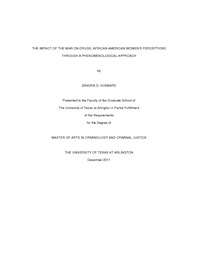
ATTENTION: The works hosted here are being migrated to a new repository that will consolidate resources, improve discoverability, and better show UTA's research impact on the global community. We will update authors as the migration progresses. Please see MavMatrix for more information.
Show simple item record
| dc.contributor.author | Hubbard, Zandra D. | en_US |
| dc.date.accessioned | 2012-04-11T20:59:29Z | |
| dc.date.available | 2012-04-11T20:59:29Z | |
| dc.date.issued | 2012-04-11 | |
| dc.date.submitted | January 2011 | en_US |
| dc.identifier.other | DISS-11496 | en_US |
| dc.identifier.uri | http://hdl.handle.net/10106/9638 | |
| dc.description.abstract | The purpose of this study was to explore the perceptions of African-American women who have been impacted by incarceration based on drug offense. Studies have indicated that in last twenty years, women have been incarcerated at a much higher rate than their male counterparts (Bureau of Statistics Bulletin, 2009; Kappeler & Porter, 2005; Harrison & Beck, 2003).African-American women have the highest imprisonment rate (Tonry, 1995; Nunn, 2002). As a result, this study attempted to portray the impact of the war on drugs on African- American women while considering all the factors relevant to their incarceration phenomenon. This qualitative study was conducted with a sample of 10 African-American women residing in the Dallas/Fort Worth area. A phenomenological approach was used to extract information from the participants through in-depth interviews. The approach was best suited for this study given the nature of the research. The study found that women were drawn to the drug culture for various reasons amongst which are peer pressure, naiveté, and unresolved emotional issues. Furthermore, the study found that the incarceration of the women had far more reaching consequences especially on families when children are involved. Additionally, the study affirmed that during the incarceration of women, the kingship system of care giving for the children left behind remained the most popular practice amongst African-American women. In conclusion, the study corroborated the findings of earlier studies. However, the study concluded that children lacked any therapeutic intervention during their mother's incarceration. Children of the mothers in this study received no intervention to help them cope with their loss and grief over their mother's absences. Based on this assertion, there is a policy implication in providing therapy for children of school age by the schools, the courts, and other social agencies. There is also a need for mandatory training, education and trades skills knowledge for imprisoned women. Further research needs to be conducted on how to best provide a wraparound care for children and family members when a mother of children is incarcerated. | en_US |
| dc.description.sponsorship | Phillips, Sara | en_US |
| dc.language.iso | en | en_US |
| dc.publisher | Criminology & Criminal Justice | en_US |
| dc.title | The Impact Of The War On Drugs: African-American Women's Perceptions Through A Phenomenological Approach | en_US |
| dc.type | M.A. | en_US |
| dc.contributor.committeeChair | Phillips, Sara | en_US |
| dc.degree.department | Criminology & Criminal Justice | en_US |
| dc.degree.discipline | Criminology & Criminal Justice | en_US |
| dc.degree.grantor | University of Texas at Arlington | en_US |
| dc.degree.level | masters | en_US |
| dc.degree.name | M.A. | en_US |
Files in this item
- Name:
- Hubbard_uta_2502M_11496.pdf
- Size:
- 283.7Kb
- Format:
- PDF
This item appears in the following Collection(s)
Show simple item record


